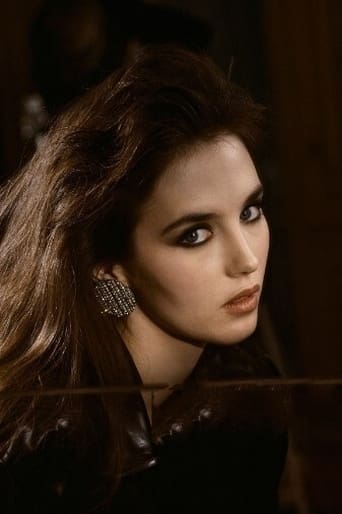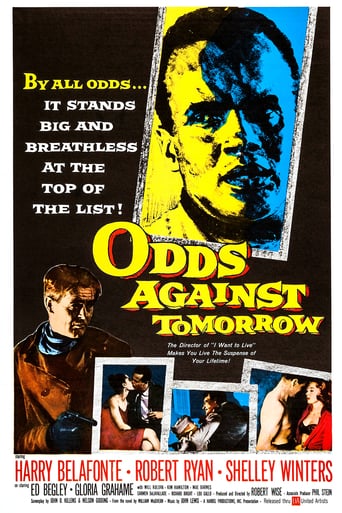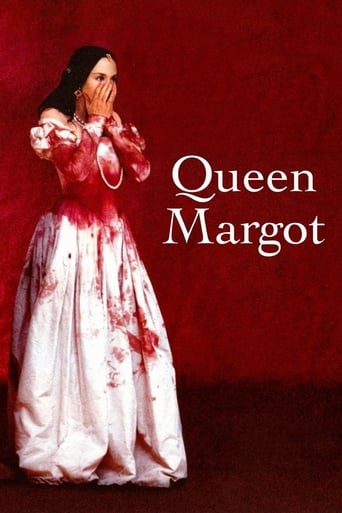
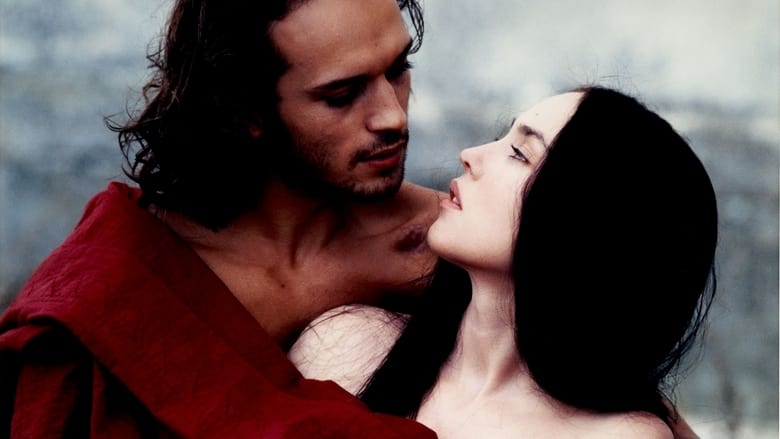
Queen Margot (1994)
Paris, Kingdom of France, August 18, 1572. To avoid the outbreak of a religious war, the Catholic princess Marguerite de Valois, sister of the feeble King Charles IX, marries the Huguenot King Henry III of Navarre.
Watch Trailer
Cast
Similar titles
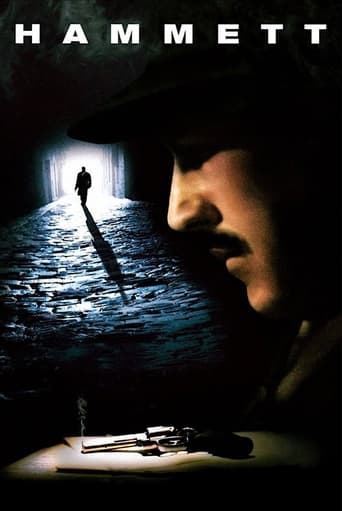
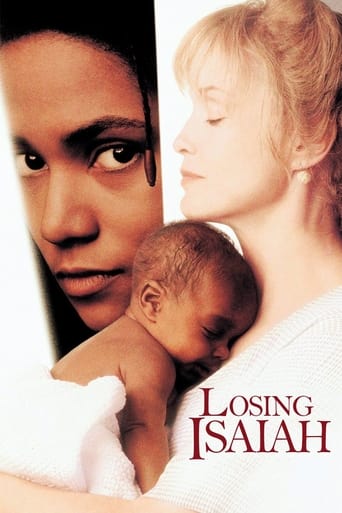

Reviews
Perfect cast and a good story
Very interesting film. Was caught on the premise when seeing the trailer but unsure as to what the outcome would be for the showing. As it turns out, it was a very good film.
It is an exhilarating, distressing, funny and profound film, with one of the more memorable film scores in years,
The tone of this movie is interesting -- the stakes are both dramatic and high, but it's balanced with a lot of fun, tongue and cheek dialogue.
Well, rarely have I seen a period movie of such poor standard. A period piece from 1994, I might add. One would think it had been filmed in the early 80s where stories were often quite naïve.The robes were magnificent and Isabelle Adjani looks like a perfect porcelain doll but the acting, the storytelling, the editing - they were all horrendous.Picture one of those romantic novels with undeveloped shallow characters you enjoyed when you were 12 and make one of them into a movie - this is the excact feeling I got when I watched La Reine Margot. SPOILER (Except without the usual happy endings those novels used to give you of course).The only positive comment this movie will get from me is that Vincent Perez looked incredibly sexy and hot and his final scene was quite heartbreaking. For that alone I will give this poorly made movie 2 out of 10 stars. It really shouldn't get any.
I love well done historical fiction and films. This one is excellently done, in it's acting, sumptuous sets, costumes, lively pace and adventure and occasional high violence. It's also sensually smoking, with the gorgeous and intensely passionate and feminine Adjani holding nothing back. She even manages at twice the age to look almost young enough to play 19 year old Margot at her wedding.It's a fairly easy film to enjoy if you don't worry too much about the plot turns and detailed historical machinations, and even more rewarding to watch several times or more seriously, especially if you do some background reading at Wikipedia or elsewhere.Its historical accuracy is however a decidedly mixed picture. The sense of 16th century French court life, the major historical events including the massacre, and almost all the major figures are quite accurately portrayed. Even such figures as the Protestant Admiral Coligny and Guise, Margot's principal lover at the time of her arranged marriage, are accurately portrayed. De la Mole seems to be either wholly or largely invented, but it's common for more wholly personal charters to be in historical fiction and that's generally fine with me. So too is it here, except in essence it portrays him as the love of her life whereas she doesn't seem to really have had one.The film though seeks not merely to view Queen Margot and her voluminous affairs sympathetically, but to entirely lionize her for invented reasons. Given that she's the principal character in the film and not a trivial historical figure, that's not unimportant. While not hiding the fact that she never loved her husband and had many lovers, it did soft peddle her pronounced and highly indiscrete promiscuity, and largely invented both her "sisterly" loyalty to her husband, and tolerant and humanitarian heroic acts on behalf of him and the Protestant Huguenots more generally.Following Dumas it seeks to portray her as a woman who loyally and enduringly loved a man through thick and thin, just not the man she was forced to marry, but instead the minor Huguenot la Mole. In fact Margot's relationships seemed to have been if often passionate, also often simultaneous, overlapping, in quick succession, and not especially marked by enduring loyalty. If the contemporary portraits at Wikipedia can be believed, she while attractive was also not the transcendent beauty that is Adjani, though I hardly complain that Adjani was chosen. I'm not condemning Margot's sexual voraciousness but I am saying that the whitewashed, false and sanitized view of it here is rather in the nature of propaganda or myth. At one point for example la Mole says she's been fated to have lovers who die off on her, which seems to have had little basis.It was not unaccepted at the time for queens or female aristocrats in passionless arranged marriages to have lovers, but they were generally supposed to do so discretely, in a way that did not bring ridicule or dishonor to their husband, if honorable. Husbands too, though admittedly more universally tolerated in having affairs, were supposed to honor their wives. Both were also expected to try for some sort of marital love or at least a kind of intimate respect, and to attempt to produce legitimate heirs. Queen Margot seems to have never done any of this, or certainly not much. Most unreformed male libertines who accomplish little aren't so loved either.It's not clear she ever accomplished much, including having any children, not to mention any heir to the French throne which she could have done (unless as seems likely she was, or became, barren - STD's?).More important though is the way the film seeks to portray Margot as a heroine to the persecuted Huguenots, not because she believed in their religious cause, but because she was a firm believer in tolerance and humanitarianism, or became both after witnessing the massacre. Both were true of her husband Henri, who acted upon them especially after becoming "the Good" King Henri of France, but I see little evidence they were of Margot. Instead I strongly suspect she was lionized by Alexandre Dumas, and likely by earlier Huguenot tales, traditions and perhaps lesser novels, in aide of gallantry, the Huguenot and liberal cause and their integration into French national affection. (There was after all, they said, at least one good French royal at the time of the St. Bartholomew's massacre.) This seems built largely on Queen Margot's being the one member of the French royal family who wasn't intent on persecuting the Huguenots, since her interests were rather elsewhere than religion, politics or idealism.As well her close personal, "sisterly", relationship with her husband seems to be almost or entirely invented by Dumas, in service of our sympathy for her. Instead Henri several times provided sanctuary to her when she had nowhere else to go, despite their at best strained and tempestuous and thereafter icy relationship. Henri did not in fact seek to bring Margot to Navarre with him when he fled Paris nor did she want to go, with or without her lover(s). Instead several years later she partly fled there from her brother King Henry III of France (who takes power as the film ends) and was partly banished due to her increasingly scandalous and heedless behavior. Again much later, when she had long been divorced from Henri and grown old, isolated and nearly penniless, in an act which speaks much more about Henri's character than their relationship, Henri brought her back to the French court, where she eventually had some role in helping care for his children by his second wife. I've also seen no evidence she helped Henri escape to Navarre or before that convinced him to convert to Catholicism to save his life.I can see much reason to understand and have some sympathy for Queen Margot, but little reason to view her as a heroine.
I can't recall ever being disappointed in a film written by Daniele Thompson who has gone on to prove herself a brilliant writer-director also. Nothing if not versatile she began with one of the biggest box-office hits in French cinema, La Grande Vadrouille, which is still being revived close to half a century later and continued in comedic vein with such titles as Les Folies de grandeur and The Adventures of Rabbi Jacob whilst along the way launching the career of Sophie Marceau via La Boum - if these two ladies were fillies rather than filles we could employ handicapper terms to note that Marceau has just released her own second film as writer-director - before turning serious as she does here and also with Those Who Love Me Can Take The Train. This time around she is working with historical facts as distorted through the prism of Alexander Dumas and giving them a new coat of paint before setting them before Isabelle Adjani, Virna Lisi, Daniel Auteuil, Jean-Huges Anglade, Pascall Greggory, Vincent Perez and, if you're paying attention to every frame, Valeria Bruni-Tedeschi, all of which, with the possible exception of Perez, turn in fine performances modulating toward the exceptional in the case of Virna Lisi's Catherine de Medici. The plot has been discussed elsewhere so suffice it to say that as costume dramas go this is among the best even if the direction is the odd light year behind Thompson's screenplay.
Isabelle Adjani really stole the limelight here with her incredible talent and beauty. I was utterly floored when I saw that luminous glow on her face which resembles a true goddess. Her mixed parentage of Jewish and German roots certainly helped in a way. Vincent Perez was perfect as the suave handsome lover of Margot, and so were the rest of the cast which include the kings and future kings on both sides.The story didn't have a strong outline and was rather weak but overall the acting pulled it off. There was much gore with swords slashing and piercing through human flesh, bodies all piled up along the streets and blood was seen streaming out from cut wounds freely. There was a scene when a man's neck was slashed and the flesh just tore apart revealing everything inside with blood splattered all over. Nude bodies are a free sight in this film and we get to see heads that are detached from the carcasses. No wonder this movie was banned here in Asia and got an R rating for US audience. It's amazing that Spain rated this film at 13 as i seriously doubt this movie should even be suitable to be watched by kids of age 15 and below.Did I mention this movie got a lot of nudes on offer? Yes, we get to see both Vincent and Isabelle baring it all too in the show, especially the former. And I really mean "ALL". Kudos to Vincent who really have the guts to bare it all in two separate scenes. Salute those frenchies.Overall a good watch and worthy of recommendation, with young teenage kids and extremists in Catholic/Prostestants preachings an exception.
